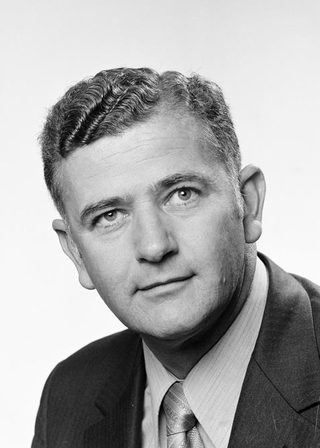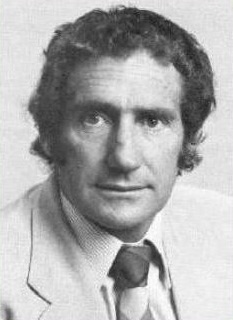Related Research Articles

John Douglas Anthony was an Australian politician. He served as leader of the National Party of Australia from 1971 to 1984 and was the second and longest-serving deputy prime minister, holding the position under John Gorton (1971), William McMahon (1971–1972) and Malcolm Fraser (1975–1983).

Ian McCahon Sinclair is an Australian former politician who served as a Member of Parliament for 35 years, and was leader of the National Party from 1984 to 1989. He served as either a minister or opposition frontbencher for all but a few months from 1965 to 1989, and later Speaker of the House of Representatives from March to August 1998.

Ian Malcolm Macphee AO is an Australian former politician. He held ministerial office in the Fraser government as Minister for Productivity (1976–1979), Immigration and Ethnic Affairs (1979–1982), and Minister for Employment and Youth Affairs (1982–1983). He was a member of the House of Representatives from 1974 to 1990, representing the Liberal Party. He was known for his contributions in developing Australian multiculturalism as immigration minister and for being one of the most prominent "small-l" liberals within the Liberal Party.
Belinda Jane Neal is an Australian politician who currently serves as a councillor for Gosford West Ward on Central Coast Council since 2024.
Suzanne Margaret West is a former Australian politician and nurse who was the first woman to serve as a Senator for New South Wales. A member of the Australian Labor Party (ALP), she was appointed to the Senate in February 1987 following the resignation of Doug McClelland. She lost her seat at the 1987 federal election but returned at the 1990 election and was re-elected in 1996. She did not seek re-election in 2001 and retired at the expiration of her term in June 2002.
Colin Hollis is a retired Australian politician. He was a member of the House of Representatives from 1983 to 2001, representing the Australian Labor Party (ALP).

Allan Duncan Fraser was an Australian politician and journalist. He served as a member of the House of Representatives from 1943 to 1966 and from 1969 to 1972, representing the Division of Eden-Monaro for the Labor Party.
Murray Evan Sainsbury is a former Australian politician. He was a member of the House of Representatives from 1975 to 1983, representing the Division of Eden-Monaro as a member of the Liberal Party. He was a civil engineer before entering politics.

Robert Bruce Whan was an Australian politician. He was a member of the Australian Labor Party (ALP) and represented the Division of Eden-Monaro in the House of Representatives from 1972 to 1975. He worked in the wool industry before entering politics.

Barry Cohen AM was an Australian politician. He was a member of the Australian Labor Party (ALP) and served in federal parliament from 1969 to 1990, representing the Division of Robertson in New South Wales. He held ministerial office in the Hawke government from 1983 to 1987.

Peter Frederick Morris is an Australian former politician. He held senior ministerial office in the Hawke government, serving as Minister for Transport (1983–1987), Aviation (1984–1987), Resources (1987–1988), Transport and Communications Support (1988), and Industrial Relations (1988–1990). He was a member of the House of Representatives from 1972 to 1998, representing the seat of Shortland for the Australian Labor Party (ALP). His brother Allan and son Matthew were also members of parliament.

Leonard Joseph Keogh was an Australian politician. He was a member of the Australian Labor Party (ALP) and served in the House of Representatives from 1969 to 1975 and from 1983 to 1987. He represented the Queensland seat of Bowman and later served as president of the Redland Shire Council from 1991 to 1994.
Michael Ehrenfried Baume is a former Australian politician. A member of the Liberal Party, he served in the House of Representatives from 1975 to 1983 and as a Senator for New South Wales from 1985 to 1996. He was a parliamentary secretary in the Fraser government and was later a shadow minister. He was a business journalist and stockbroker before entering politics and later served as the Australian consul-general in New York City from 1996 to 2001.

Daniel Thomas McVeigh is a former Australian politician. He served in the House of Representatives from 1972 to 1988, representing the National Party. He held ministerial office in the Fraser government, serving as Minister for Housing and Construction (1980–1982) and Minister for Home Affairs and the Environment (1982–1983).

Wallace Clyde Fife was an Australian politician and minister in the New South Wales Government and Federal Government.
John Graham Mountford was an Australian politician. He was a member of the Australian Labor Party (ALP) and served in the House of Representatives from 1980 to 1990, representing the New South Wales seat of Banks. He was previously mayor of Canterbury from 1977 to 1980.
Garry Owen Barr Nehl, AM was an Australian politician. He was a member of the House of Representatives from 1984 to 2001, representing the seat of Cowper for the National Party. He served as deputy speaker from 1996 to 2001. He worked in journalism and public relations before his election to federal parliament and was a leading campaigner for New England statehood at the height of the movement in the 1960s.
Allan Agapitos Morris is a former Australian politician. He was a member of the House of Representatives from 1983 to 2001, representing the seat of Newcastle for the Australian Labor Party (ALP). He also served on the Newcastle City Council from 1974 to 1983. He was expelled from the ALP in 2007.

John Michael Spender was an Australian politician, diplomat and barrister. He was a member of the House of Representatives from 1980 to 1990, representing the Liberal Party, and was a shadow minister under Andrew Peacock and John Howard. He later served as Ambassador to France from 1996 to 2000.
The leader of the National Party of Australia is elected by majority vote of the federal parliamentary party. A deputy leader is elected in the same fashion. The party's longest-serving leader is Earle Page, who held the office from 1921 to 1939. The party's current leader is David Littleproud, who has held this office since 2022. It is historically rare for the incumbent leader and deputy leader to be opposed in a bid for re-election.
References
- 1 2 3 "Lusher, Stephen Augustus". Parliamentary Handbook. Parliament of Australia. Retrieved 25 August 2024.
- 1 2 3 "Lusher finds uncomfortable facts". The Canberra Times. 12 February 1983.
- ↑ "Brewer endorsed unopposed". The Canberra Times. 22 April 1974.
- ↑ Malone, Paul (18 January 1984). "New leader Sinclair faces questions on credibility". The Canberra Times.
- ↑ "Lusher concedes seat of Hume". The Canberra Times. 7 December 1984.